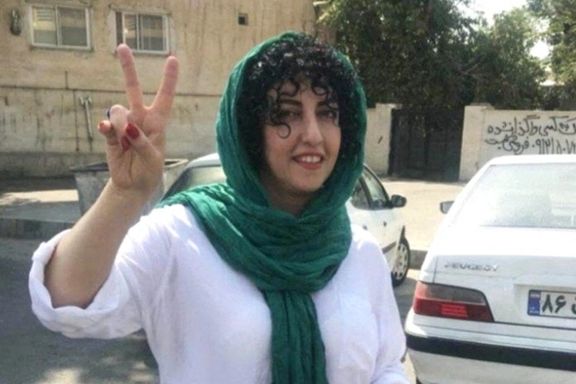As The World Congratulates, Iran Condemns Nobel Prize For Activist

President Joe Biden and a host of Western leaders and top officials have congratulated imprisoned Iranian activist Nargess Mohammadi for winning the Nobel Peace Prize.

President Joe Biden and a host of Western leaders and top officials have congratulated imprisoned Iranian activist Nargess Mohammadi for winning the Nobel Peace Prize.
“Ms. Mohammadi’s commitment to building the future that women and all people in Iran deserve is an inspiration to people everywhere who are fighting for human rights and basic human dignity,” President Biden said in his statement.
UN Secretary General Antonio Guterres tweeted that the prize awarded to Narges Mohammadi is an important reminder that “women's rights are facing a strong pushback, in Iran and elsewhere,” adding, “This Prize is a tribute to all the women fighting for their rights at the risk of their freedom, health and even their lives.”
However, Iran's Foreign Ministry spokesman condemned the Nobel Peace awarded to Mohammadi as a "politically motivated move”.
“The Nobel Peace Committee has awarded the Peace Prize to a person who has been convicted for repeatedly violating laws and committing criminal acts,” Foreign Ministry Spokesman Nasser Kanani said in a statement Friday and accused “some European governments” including Norway of having “anti-Iranian and interventionist policies”.
Alleging that the Nobel Peace Committee’s decision was based on an “unconventional and selective approach”, Kanani said this was “another link in the chain of pressure from Western circles against Iran”. He added that giving the award to Mohammadi would only make the Islamic Republic determined “to pursue its independent policy”.
In a written statement to The New York Times, apparently written before the public announcement of the award, Mohammadi said the global support and recognition of her human rights advocacy makes her “more resolved, more responsible, more passionate and more hopeful”, adding that she also hoped the recognition will make Iranians protesting for change “stronger and more organized”.
Narges Mohammadi, 51, was the deputy head and spokeswoman of the Defenders of Human Rights Center, a non-governmental organization founded by Shirin Ebadi, the 2003 Nobel Peace Laureate, and others in 2001.
Iranian authorities never allowed the official registration of the organization which won the 2003 Human Rights Award from the French National Commission of Human Rights and have always persecuted its members.
An Instagram account that Mohammadi has authorized to post on her behalf thanked everyone for congratulatory messages after the news broke and said it was not possible to talk to her because political prisoners in the ward where she is held are not allowed to make phone calls on Thursdays and Fridays.
This year’s other Iranian Nobel Peace Prize candidates were also women and included US-based activist Masih Alinejad, rights campaigner Nasrin Sotudeh, as well as Elaheh Hamedi and Niloufar Mohammadi, two journalists who have been in prison for over a year for their reporting of Mahsa (Jina) Amini’s death in the custody of the morality police in September last year.
Mohammadi’s 16-year-old son Ali Rahmani has told the media that the prize belonged to all Iranians, not only her mother, for their fight, and that he is proud of his mother.
In 2015 Ali and his twin sister Kiana had to leave the country to join their father Taghi Rahmani, a journalist and former political prisoner, because their mother was going to begin serving a ten-year prison sentence and to keep safe from harassment of the authorities.
Rahmani had to flee Iran in 2012 after repeated arrest and years of imprisonment. Mohammadi’s children have been living in France since then and have never had a chance to see their mother again.
Authorities have also repeatedly punished Mohammadi by refusing to let her speak with her children and husband. Her son Ali says he has not spoken to his mother in twenty months.